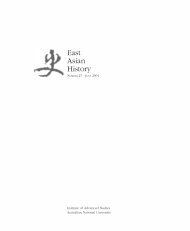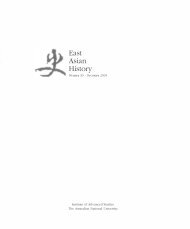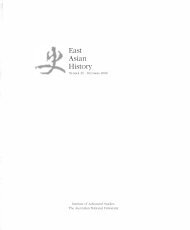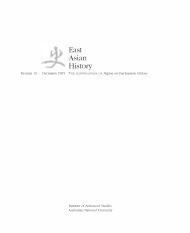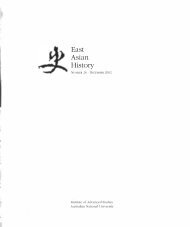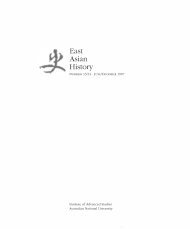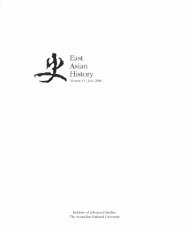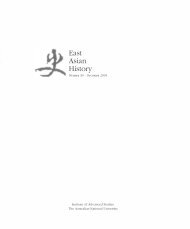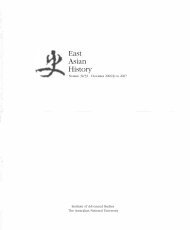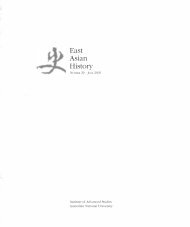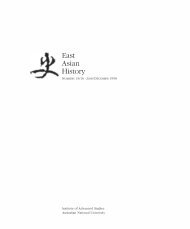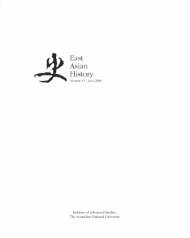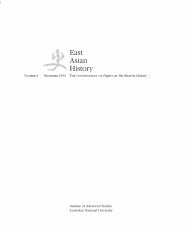Observations from a Film - (Miriam Lang) (PDF ... - East Asian History
Observations from a Film - (Miriam Lang) (PDF ... - East Asian History
Observations from a Film - (Miriam Lang) (PDF ... - East Asian History
- No tags were found...
You also want an ePaper? Increase the reach of your titles
YUMPU automatically turns print PDFs into web optimized ePapers that Google loves.
TRADITIONAL MUSICIANS IN CONTEMPORARY CHINA181In the current century of self-conscious modernization, this existingpattern of reworking older music has been compounded by the introductionof a new romantic aesthetic <strong>from</strong> the West, to the extent that the music nowperformed in concert halls as traditional music bears little stylistic resemblanceto that played by the elderly conservators of local traditions whoreceived their training in the late Imperial and early Republican eras. Youngperformers appear unanimous in their preference for the new romantic styleof playing.Zhou Haihong's claim that the aesthetic basis of Chinese music has beenundermined by Westernization and reform is an unusual point of view in themodem Chinese musical community (although common among Westernobservers).87 Chinese audiences accept yesterday's innovations as ancienttradition because the musical world presents them as such. Thus Chineseinstrumental music is deprived of the status it could have had as a remnantof the past; it is successful neither as a form of popular music nor as a pieceof history with a unique aesthetic quality.In contrast to the Chinese situation, the burgeoning interest in the Westin 'early music' is a prominent example of how a musical form can becomepopular on the basis of 'authenticity'. A similar phenomenon is most unlikelyto occur in China in the near future for a number of reasons. Firstly, a nationstill self-consciously preoccupied with progress and modernization is notpredisposed to preserve and promote aspects of its 'backward' traditions(assuming that there can be agreement on what the authentically 'traditional'elements of the modernized and Westernized Chinese repertoire actuallyare). As Kraus points out, "the question of preserving a sample of China'smusical past simply does not arise, just as it did not in the mind of Berliozin regard to French music. ,, 88 In addition, Kraus notes that "there are still manypeasants in China living in material conditions little different <strong>from</strong> those thatgave rise to the opera and the traditional musical instruments of the Qingdynasty. While this is true, ... [people] are unlikely to find musical nostalgiacompatible with their quest for modernity."89 Since there is no communityof devoted listeners to sustain it in a free market environment (as there hasbeen with Western 'early music'), the maintenance of 'authentic' music inChina would thus be impossible without extensive financial support <strong>from</strong>government agencies, which is not at present forthCOming.In the light of all of these factors, it is unsurprising that Swan Song, in itsportrayal of the waning popularity of traditional Chinese instrumental music,presents little hope for its revival. Of all the different social groups that appearin the film-the folk artists, the younger generation, the last of the old-stylegenius composers, the Chinese opera star, the conservatory intellectualtrained in Western music, the overseas Chinese impresario and the publishers--noneis shown as a potential saviour of traditional music. Zhang Zeminghimself states his belief that the generation represented by Guanzai and hishalf-sister, after the extraordinary and complex experiences they underwentduring the "ten years of chaos," cannot be expected to save the day: "to87 In my view this is one of the main reasonsfor the neglect of Chinese instrumentalmusic by Western musicologist, who placea premium on 'authentidty·.88 Kraus, Pianos and politiCS, p.119.89 Ibid.



